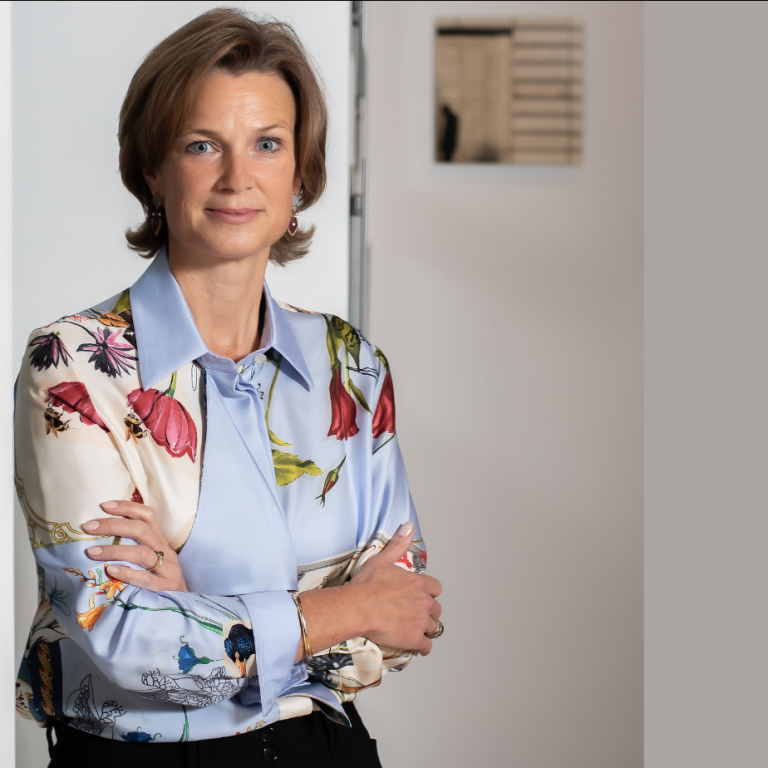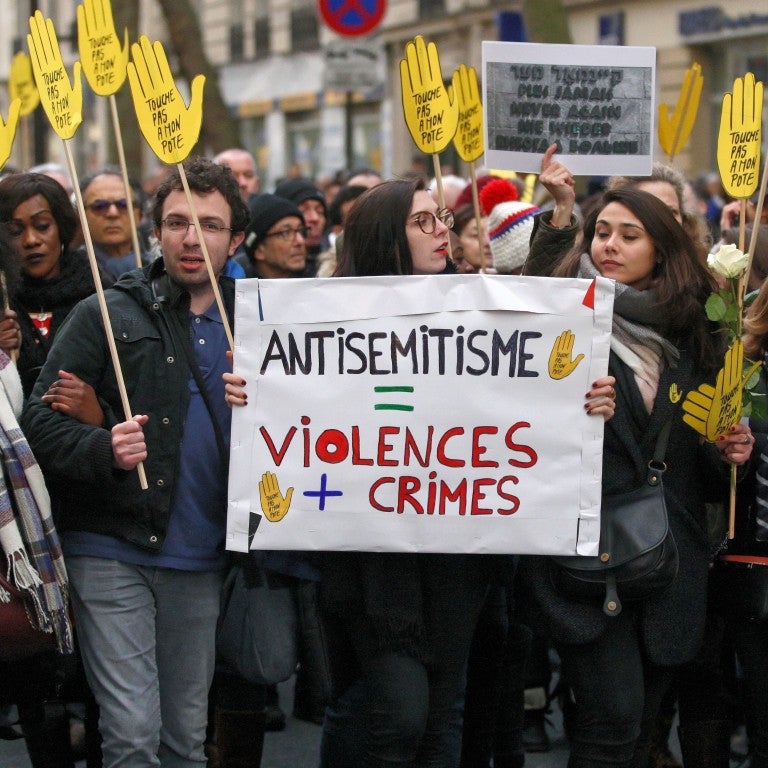August 5, 2021
When the Camp David Summit failed to yield an Israeli-Palestinian peace agreement and Palestinians incited violence against Israelis in September 2000 at the beginning of the Second Intifada, Jews across Western Europe came under attack.
American Jewish Committee (AJC) CEO David Harris was horrified to see Europe devolve once again into a breeding ground for Jew-hatred. He took action and opened two new offices on the continent, first in Paris and then in Brussels, to wake European governments up to the reality of growing antisemitism from the far right, the far left, and Muslim extremists, advocating for measures to protect their Jewish communities.
“The response of the French president at the time was ‘I know my country and there is no problem of antisemitism here,’” said Simone Rodan-Benzaquen, Managing Director of Paris-based AJC Europe.
Over the last decade, horrific assaults and worrying trends have put to rest such exhortations.
The most recent European Union-commissioned poll of EU Jews paints a concerning picture for the continent.
About 85% of European Jews said antisemitism was a serious problem, with 89% saying it had increased in their country over the past five years. French Jews, the largest Jewish community in Europe, had the highest level of concern at 95%, followed by Belgian Jews at 86%.
Twenty years after the Second Intifada, the U.S. now faces an onslaught of anti-Jewish hate in the wake of attacks on Israel by the Gaza-based terrorist group Hamas. Here are eight lessons Americans can learn from Europe’s experience with intensifying antisemitism, according to Rodan-Benzaquen.
-
Don’t think rising antisemitism is a temporary problem or that what happened in Europe won’t happen in America.
“The reality is that antisemitism will not just go away, and no country is safe unless something is done about it,” she said. “Governments, politicians, and civil society cannot drop the ball, even when things seem better. Hesitation and lip service won’t work. They must condemn antisemitism and its proponents when it surfaces, prepare a clear action plan, and commit the necessary resources to fight it.”
After antisemitism rose again in France, the government created an Inter-Ministerial Delegation for the fight against racism, antisemitism and homophobia that renews its action plan against antisemitism every two years.
Similar efforts are ongoing in Germany, where the nation’s antisemitism commissioner Felix Klein, an alum of AJC’s Project Interchange trip to Israel, has been working on a national strategy to combat antisemitism.
-
Don’t let anyone play politics with antisemitism.
Ever since the September 2000 eruption of antisemitism in Europe, AJC has said that antisemitism comes from at least three sources – the far-right, far-left, and religious extremists.
“Each form of antisemitism needs to be recognized and fought differently,” Rodan-Benzaquen said. “Don’t let anyone play politics with antisemitism. Those who only call out antisemitism from one source do not care about the safety of the Jewish people.”
Antisemitism from the left
AJC Paris Director Anne-Sophie Sebban said France’s Socialist Party is clearly divided between those who raise their voices against antisemitism and those who prefer to turn a blind eye on the phenomenon of anti-Zionism.
Antisemitic violence has emerged during pro-Palestinian protests without clear condemnation from public officials, she said.
“The extreme left was intellectually justifying what was happening on the ground against Jews as they integrated anti-Zionism as part of their core political ideology,” Sebban said.
Politician Jean-Luc Mélenchon, head of the far-left Les Insoumis political party, recently suggested during an interview with a Toulouse radio station that a “deep state” (aka Jews) would cook up a terrorist incident during the 2022 presidential campaign to control the results. As an example, he pointed to the 2012 slaying of a teacher and three children at a Jewish school in Toulouse by an Islamist terrorist one month before the presidential election that was eventually won by Francois Hollande of the Socialist Party
Meanwhile in Britain, former Labour leader Jeremy Corbyn was suspended both as a Labour MP and party member over his response to a human rights watchdog report on antisemitism in the party. That report revealed that Corbyn took no action when he received complaints about members’ antisemitic conduct, for example, questioning on social media whether Jewish MPs had “human blood.”
Corbyn has since been reinstated as a party member but has not yet been readmitted into the parliamentary Labour party.
Rodan-Benzaquen said she will forever be grateful to former French Socialist Prime Minister Manuel Valls for speaking out against anti-Zionism.
To understand what the idea of the republic is about, you have to understand the central role played by the emancipation of the Jews,” Valls said. “It is a founding principle…. If 100,000 French people of Spanish origin were to leave, I would never say that France is not France anymore. But if 100,000 Jews leave, France will no longer be France. The French Republic will be judged a failure.”
Rodan-Benzaquen said the world must have strong voices on the left to speak up and “criticize their own camp, just as we need strong voices to speak out on the right.” “Press your congressman, the party platform, and political leaders to speak out against antisemitism coming from their own camp.”
The far right
That’s not to say antisemitism still doesn’t emanate from the far-right.
In Germany, where more than a million refugees have found a home, AJC Berlin Director Remko Leemhuis said those on the far-right end of the political spectrum, including the Alternative for Germany (AfD) party, foment xenophobia and blame Jews for empowering immigrants and minorities and wrecking white European civilization.
In France, far-right ideologue Alain Soral has referred to the “psychopathology with Zio-Judaism, something that verges on mental illness.”
In April 2017, the far-right nationalist party that leads the Hungarian coalition government plastered billboards with a photograph of a grinning George Soros, the Hungarian American philanthropist who finances liberal causes with the slogan: “Don’t Let Soros Have the Last Laugh.” Vandals soon defaced the posters with swastikas and anti-Jewish slurs.
And in Greece, the far-right Golden Dawn party folded antisemitic conspiracy theories and neo-Nazi symbols into its thuggish agenda, with aims to expand that agenda around the globe. In October 2020, members of its party leadership were found guilty of running a criminal organization.
Extremism in the name of Islam
In partnership with The Foundation for Political Innovation, a progressive French think tank, AJC Paris produced a first-of-its-kind opinion survey to gauge antisemitic prejudices among the Muslim community.
A majority of the general public named antisemitic prejudices as the primary cause for antisemitism in France (58%), followed by the ideology of Islamism (36%). In contrast, French Jews felt more threatened by those who claim to be extremists in the name of Islam (45%).
Fueling that public opinion are incidents like the January 2015 attack on the Hyper Cacher Kosher Supermarket in suburban Paris. Amedy Coulibaly, who pledged allegiance to the Islamic State of Iraq and the Levant, murdered four Jewish hostages, and held fifteen others during the kosher market siege.
The survey helped spark a degree of awareness of antisemitism in the French Muslim community, but the French government has yet to address it.
-
Recognize that antisemitism hides behind anti-Zionism.
Casting Zionism as a racist endeavor is a key tenet of antisemitism. Leaders need to recognize and combat antisemitism that hides behind antizionism in the same way that they fight other forms of antisemitism.
“Everyone knows how to recognize a neo-Nazi,” Rodan-Benzaquen said. “It’s more complicated when people hide behind ‘anti-racism’ to attack Zionism and Israel.
“The French historian Pierre-André Taguieff defines it as an ideological framework in which Jews are no longer seen as an enemy race, but as a people conveying the putatively racist ideology of Zionism. Antizionist discourse in the media and by politicians has dire consequences for Jews.”
Leemhuis said during the 2021 conflict between Israel and Hamas in Gaza, this was a reoccurring theme at all anti-Israel protests in Germany. Sebban added that, in France, a couple high-profile celebrities such as comedian Dieudonné M’bala M’bala, have made the problem even worse.
-
Hold everyone accountable for their behavior – even those who are oppressed and marginalized.
“Minorities can suffer from racism, but also be antisemitic,” Rodan-Benzaquen said. “It is difficult to get one’s head around that and certainly difficult to admit as people are often afraid of fueling racism or being accused of being racist. But it’s only if one recognizes the problem, that it can be fought.”
In France, Dieudonné, who is Black and is known for his anti-racist activism, also has become known for his antisemitic rhetoric and actions. Several organizations sued him for incitement to racial hatred after he performed a sketch that portrayed an Israeli settler as a Nazi. The comedian refused to apologize and denounced Zionism.
More notably, he also created and popularized a gesture resembling an inverted Nazi salute dubbed the quenelle, which he incorporated into a 2009 election campaign poster for the "anti-Zionist party,” explaining that he wanted "to put a quenelle into Zionism’s butt.” Since then, individuals have made a game of flashing the quenelle in photographs that are then posted on social media.
French officials have sought to ban the quenelle because of its antisemitic subtext.
-
Antisemitism isn’t a Jewish problem
Antisemitism is a harbinger for all minorities and democracies at-large.
When antisemitism is ignored or dismissed, the hatred behind it can turn into wider and broader attacks on other minorities. For example, while antisemitism in France has been on the rise for the last two decades, anti-Muslim incidents have spiked in the last two years. And as a presidential campaign approaches, the extreme right party “Rassemblement national” has never been so high in the polls.
In 2004, former UN Secretary-General Kofi Annan noted that antisemitism has flourished even in communities where Jews have never lived and has been a harbinger of discrimination against others. Yet, in his recent report on antisemitism, Ahmed Shaheed, UN Special Rapporteur on Religion Freedom and Belief, said victims of antisemitism are widely ignored or underserved.
“Antisemitism is a disease that, if left unchecked, will spread and destroy everything,” Rodan-Benzaquen said. She said we must deal with the causes, including illiberalism from the left and right, polarization, and extremism in the name of Islam. Otherwise, “the fight against antisemitism will only have limited impact.”
-
Don’t assume social media companies will regulate hate speech and incitement.
The regulation of hate speech and incitement cannot be left in the hands of social media companies alone.
Leemhuis says that in Germany crimes such as denying the Holocaust, are also considered criminal acts on social media and platforms face pressure to delete hateful content. The federal government in Germany is trying to take it one step further by introducing legislation against hate speech.
“There needs to be some form of regulation by governments, including in the U.S.,” Rodan-Benzaquen said. “Words have consequences. We’ve seen it in almost all recent attacks.”
A law similar to the one in Germany has been adopted in France. A Digital Services Act has been proposed to the European Parliament that would, among other things, address the issue of regulating hate speech online.
-
Don’t justify antisemitism.
“There can never be any form of relativism and justification of antisemitism,” Rodan-Benzaquen said. “The establishment of a clear zero-tolerance policy is needed. There can be no feeling of impunity. It will only create further violence.”
Britain’s Labour party leader Jeremy Corbyn often justified and masked his antisemitic rhetoric as concern for the welfare of Palestinians. He was once filmed telling a group gathered at the Palestinian Return Centre that “Zionists”—often used as code for Jews—“despite having lived in this country for a very long time, probably all their lives, don’t understand English irony.”
Other Labour members were documented engaging in grossly antisemitic rhetoric on social media, including “Heil Hitler,” “F*ck the Jews,” and “Jews are the problem.” But only 29 members were removed from the party.
-
Stand up against antisemitism.
Jews going after Jews won’t save Jews.
Over the last few years, new Jewish groups have sprung up over Europe including in Belgium, Italy, Switzerland and in the UK with people speaking out expressly against the actions of Israel. When Israel recently began retaliating against Hamas, Italy’s far left newspaper "Il Manifesto" published a letter signed by 2,300 young Italian Jews condemning the actions.
“I have a message for my American Jewish friends: for those who somehow think that by being anti-Zionist, you will be able to feel morally righteous,” Rodan-Benzaquen said. “If you think that being anti-Israel will somehow ‘save you,’ it won’t. The reality is that you are only caving in and helping throw fellow Jews under the bus.” “The reality is that you are only strengthening radical, racist, and illiberal forces, who might go after Jews first, but certainly won’t stop there.”





